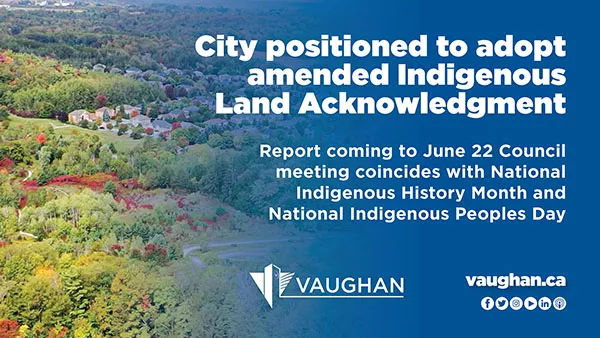City positioned to adopt amended Indigenous Land Acknowledgment
The City of
Vaughan is dedicated to fostering an inclusive, equitable, accessible and
accommodating community for all. As a reflection of this ongoing commitment,
the City is positioned to adopt an update to its Indigenous Land
Acknowledgement.
At a Committee of the Whole meeting earlier this month, Mayor Maurizio Bevilacqua and Members of Council endorsed an amendment to address existing inaccuracies. This includes changing the title from “Aboriginal Territorial Acknowledgement” to “Indigenous Land Acknowledgement,” in addition to a revised statement. It will come before Council for ratification at the Council meeting on Tuesday, June 22 and reads as follows:
“We respectfully acknowledge that the City of Vaughan is situated in the Territory and Treaty 13 lands of the Mississaugas of the Credit First Nation. We also recognize the traditional territory of the Huron-Wendat and the Haudenosaunee. The City of Vaughan is currently home to many First Nations, Métis and Inuit people today. As representatives of the people of the City of Vaughan, we are grateful to have the opportunity to work and live in this territory.”
While Vaughan City Hall remains closed to the public, citizens can tune into the Tuesday, June 22 electronic-participation Council Meeting at vaughan.ca/LiveCouncil at the start of the meeting at 1 p.m. View a full schedule of meetings at vaughan.ca/CouncilMeetings.
The timing of this amendment coincides with the City’s recognition of National Indigenous History Month in June and National Indigenous Peoples Day today, Monday, June 21, both of which were proclaimed by Vaughan Council.
Land acknowledgement statements are used in Canada by governments and other organizations, such as schools, post-secondary institutions and more, as a practice of reconciliation aimed at recognizing the traditional or treaty territories of Indigenous peoples. The Canadian Constitution recognizes three groups of Indigenous peoples: First Nations, Inuit and Métis. These are three distinct peoples with unique histories, languages, cultural practices and spiritual beliefs. A land acknowledgement statement is an avenue for recognizing what is known of past Indigenous usage and occupancy of land. They are typically used at the introduction of meetings, gatherings, events or presentations. The City's Indigenous Land Acknowledgement is delivered at the outset of committee and Council meetings, among other gatherings.
To learn more about the City's Indigenous Land Acknowledgement, reference the June 1, 2021 Committee of the Whole (1) Report: Indigenous Land Acknowledgement.
-30-

